| Srl | Item |
| 1 |
ID:
098936
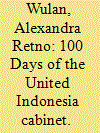

|
|
|
| 2 |
ID:
102561
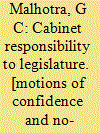

|
|
|
|
|
| Edition |
2nd ed
|
| Publication |
New Delhi, Lok Sabha Secretariat, 2004.
|
| Description |
xxxi, 1009p.
|
| Standard Number |
8120004000
|
|
|
|
|
|
|
|
|
|
|
|
Copies: C:1/I:0,R:1,Q:0
Circulation
| Accession# | Call# | Current Location | Status | Policy | Location |
| 055665 | 328.5405/MAL 055665 | Main | On Shelf | Reference books | |
|
|
|
|
| 3 |
ID:
082210
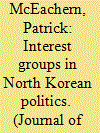

|
|
|
|
|
| Publication |
2008.
|
| Summary/Abstract |
North Korea is often characterized as some form of highly centralized rule: totalitarian, posttotalitarian, corporatist, or personalistic. This article argues that much of the confusion around understanding North Korea's actions stems from misplaced models. Much of the current thinking on North Korea's politics does not account for the limited institutional plurality in the system. The article documents how the state's political institutions have changed since the country's founding and highlights the formal and informal roles of each major bureaucracy today. The Korean Workers Party and the role of Juche have declined, but the National Defense Commission and "military-first politics" have not taken their place as reigning supreme. Rather the interaction between the Korean Workers Party, military, and cabinet helps explain and moderate policy outcomes
|
|
|
|
|
|
|
|
|
|
|
|
|
|
|
|
| 4 |
ID:
174014
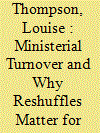

|
|
|
|
|
| Summary/Abstract |
Reshuffles are a relatively common occurrence in British politics. We expect to see them whenever a new Prime Minister enters Downing Street, after elections and following ministerial resignations. Recent research from the Institute for Government warns that the regular churn of ministers has negative consequences for policy making and for parliamentary accountability. This article summarises their latest research and what this tells us about the potential implications of Boris Johnson’s February 2020 reshuffle on government and Parliament.
|
|
|
|
|
|
|
|
|
|
|
|
|
|
|
|
| 5 |
ID:
123217
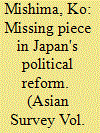

|
|
|
|
|
| Publication |
2013.
|
| Summary/Abstract |
Since 2006, a major drive for reform of the Japanese bureaucracy's personnel system has been continuing in order to enhance political control over bureaucrats. In spite of a bipartisan agreement on the reform's vision, heightened party competition has suspended its actual implementation.
|
|
|
|
|
|
|
|
|
|
|
|
|
|
|
|
| 6 |
ID:
107211
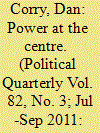

|
|
|
|
|
| Publication |
2011.
|
| Summary/Abstract |
The centre of power in the UK lies in No 10 Downing Street and is surprisingly weak in terms of numbers. This article, written by a former insider, looks at how power is exercised in a variety of ways, some formal, through cabinet and its committees some informal, through the force of personality of the Prime Minister and his team especially his policy unit. It goes on to examine the creation and functioning of the National Economic Council, set up by Gordon Brown in response to the financial and economic crisis of 2007-8. It argues that this was a successful innovation towards a more structured approach that delivered faster policy formation and delivery and created a sense of unity. While it is probably a model that works best in crisis moments, it could be taken forward in other ways.
|
|
|
|
|
|
|
|
|
|
|
|
|
|
|
|
| 7 |
ID:
090884
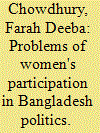

|
|
|
|
|
| Publication |
2009.
|
| Summary/Abstract |
Women's participation in politics is extremely limited in Bangladesh despite the country having had two prominent women leaders. Sheikh Hasina and Khaleda Zia gained the highest leadership positions in the government and the opposition through their family connections due to the low level of political institutionalization and the absence of suitable male heirs. By their family connections, they have overcome the problems that women otherwise face in politics. Why are Bangladeshi women not more prominent in politics? What are the problems women face when they participate in politics? Here the problems faced by women in politics in Bangladesh are analysed in both the public and the private spheres of patriarchy.
|
|
|
|
|
|
|
|
|
|
|
|
|
|
|
|
| 8 |
ID:
164044
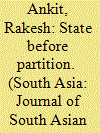

|
|
|
|
|
| Summary/Abstract |
This paper is a study of the Interim Government in British India, formed during the penultimate viceroyalty of Archibald Wavell, from September 1946 to March 1947. It tries to throw light on major and minor personalities and micro and macro processes at work in this improbable interlude and, thus, probes an overshadowed ministerial and bureaucratic set-up in the lead-up to Partition. This understudied set-up constituted yet another compelling ‘space before Partition’ which would continue to affect the Indian state after Partition. Simultaneously, the paper seeks to complicate the teleology and inevitability of Partition by showing this interim arrangement at work, which belied its name. Bringing together official texts and the personal interpretations of many participants, it approaches the period as liminal, albeit one with limitless possibilities at this juncture, of which what followed in 1947 was but one.
|
|
|
|
|
|
|
|
|
|
|
|
|
|
|
|